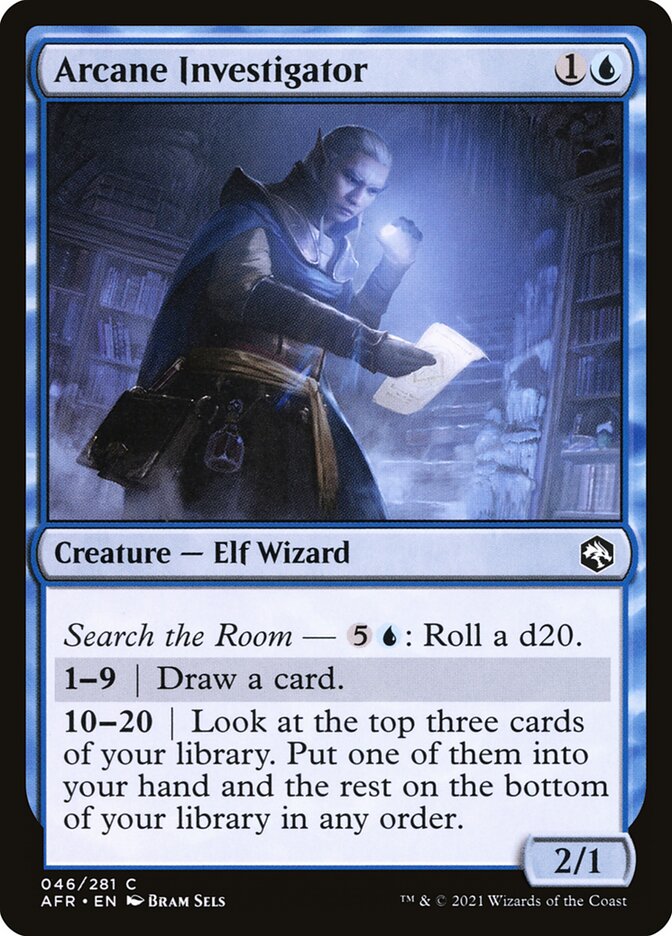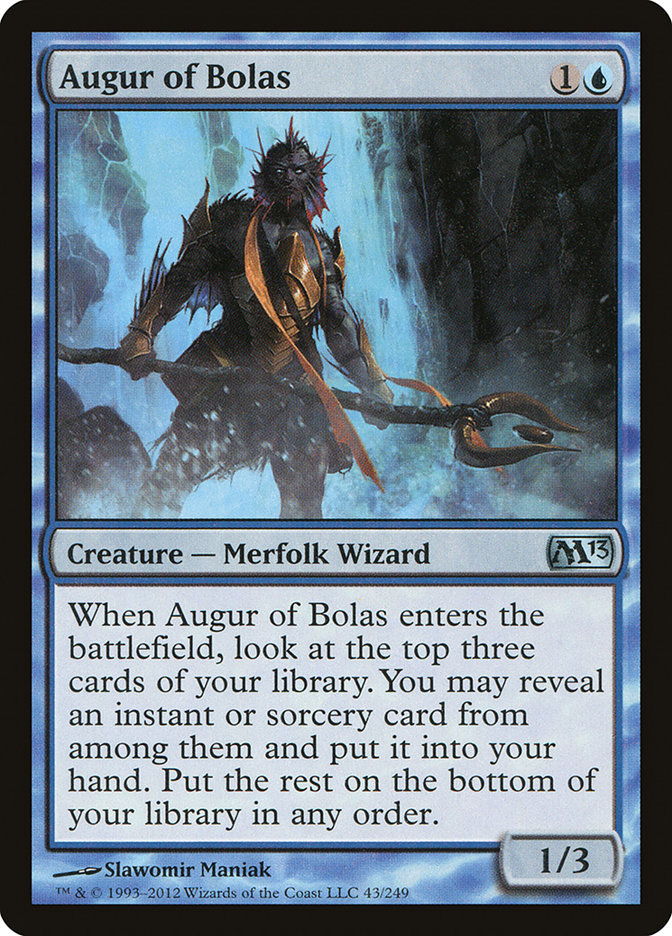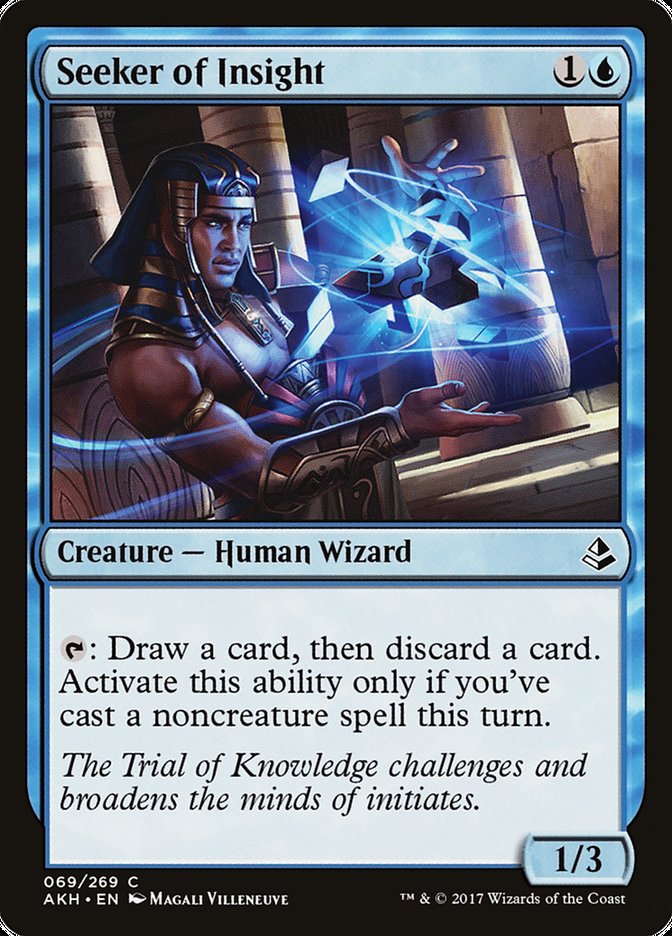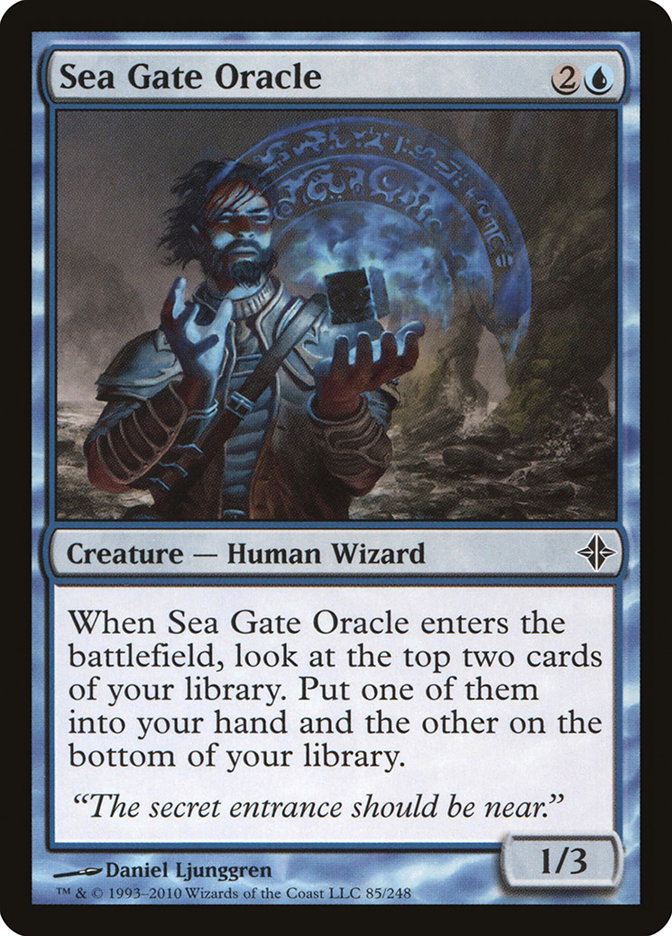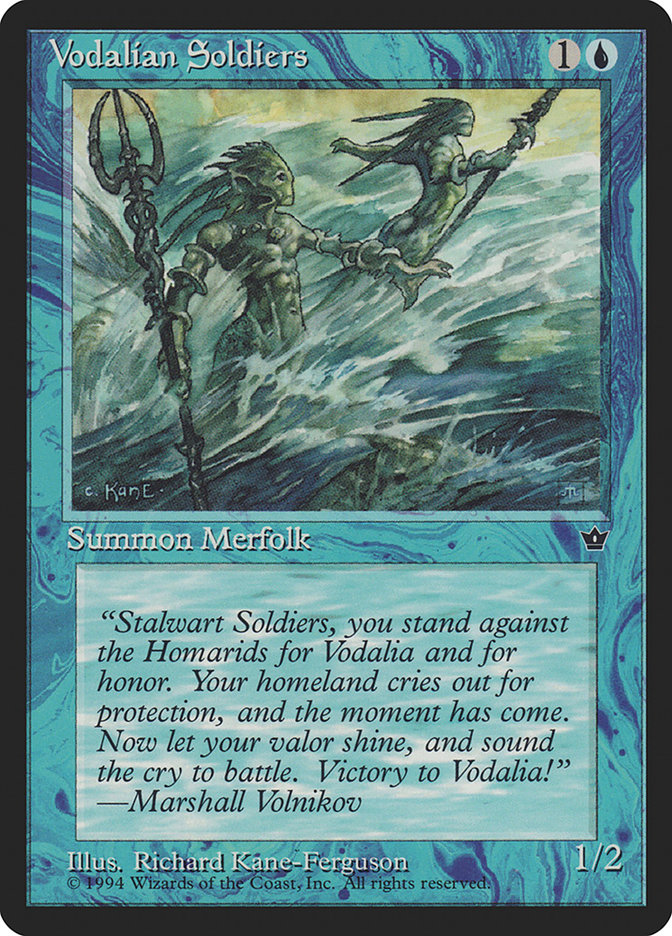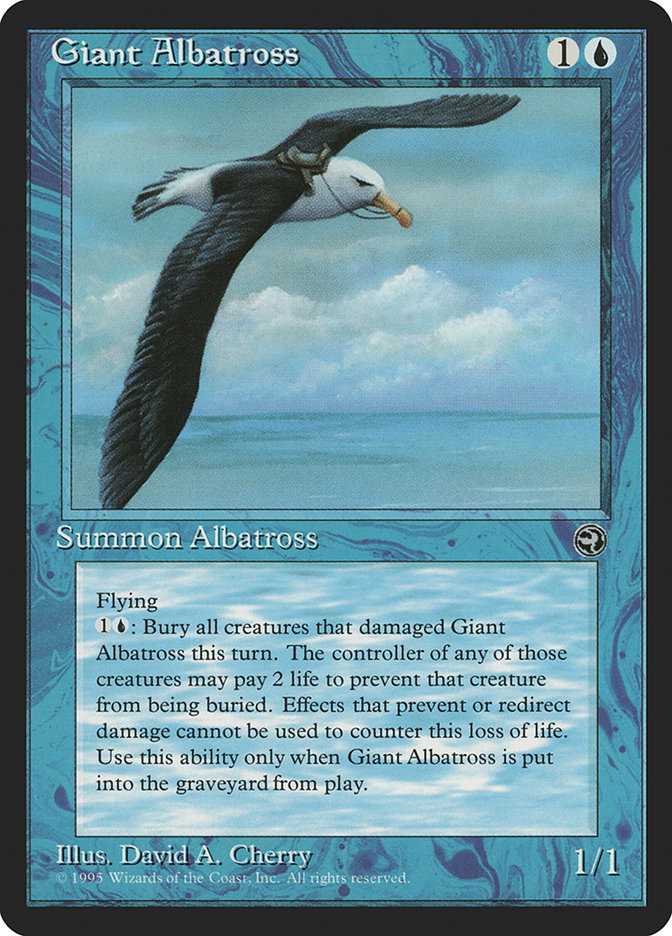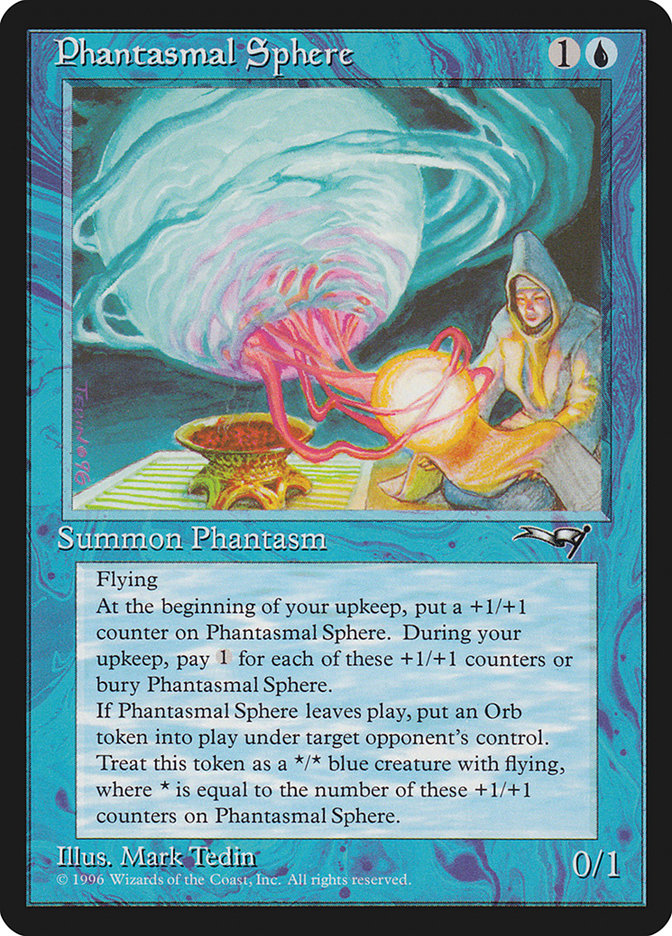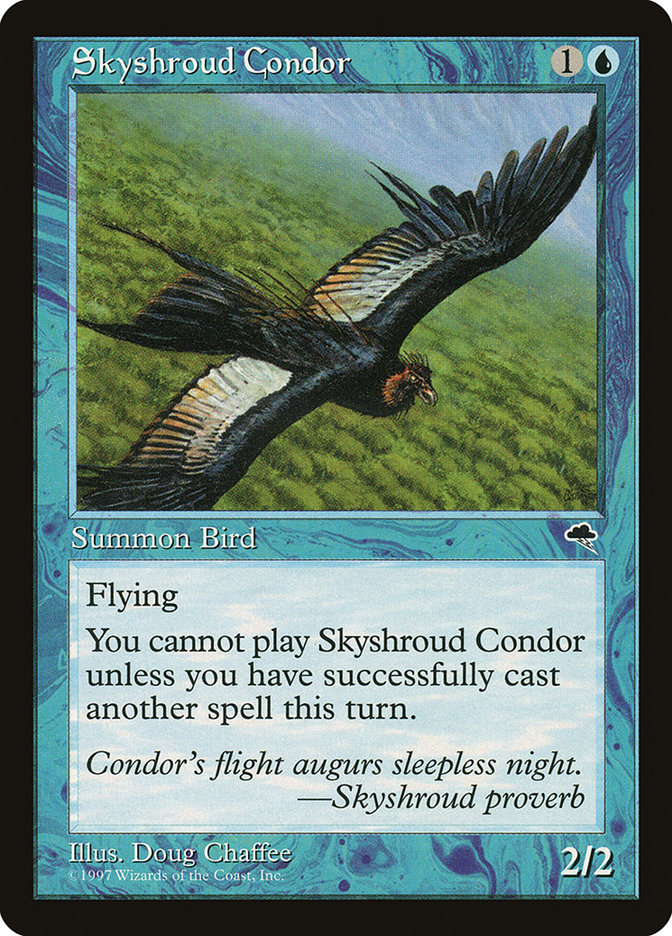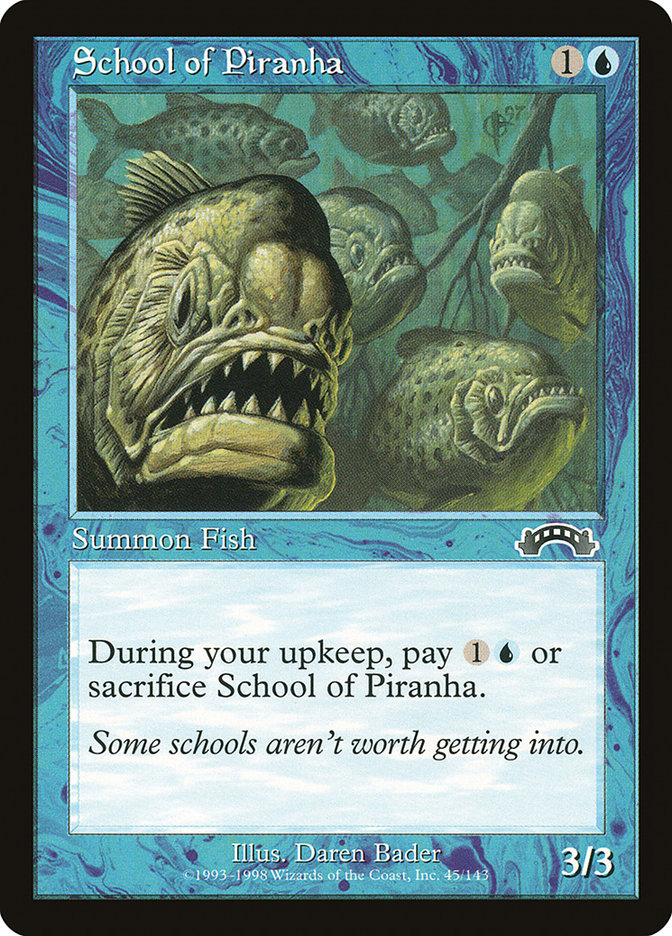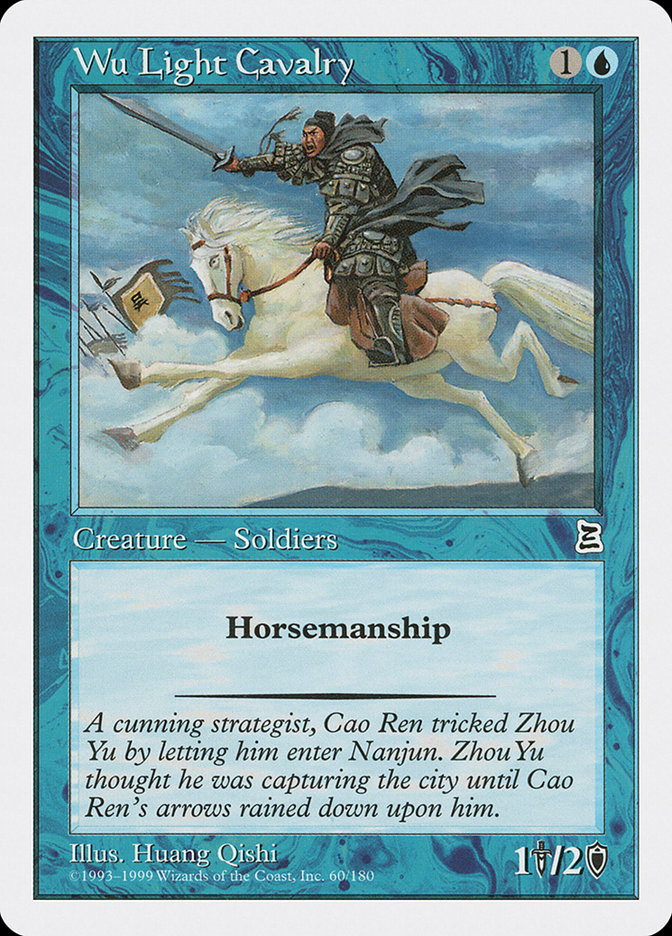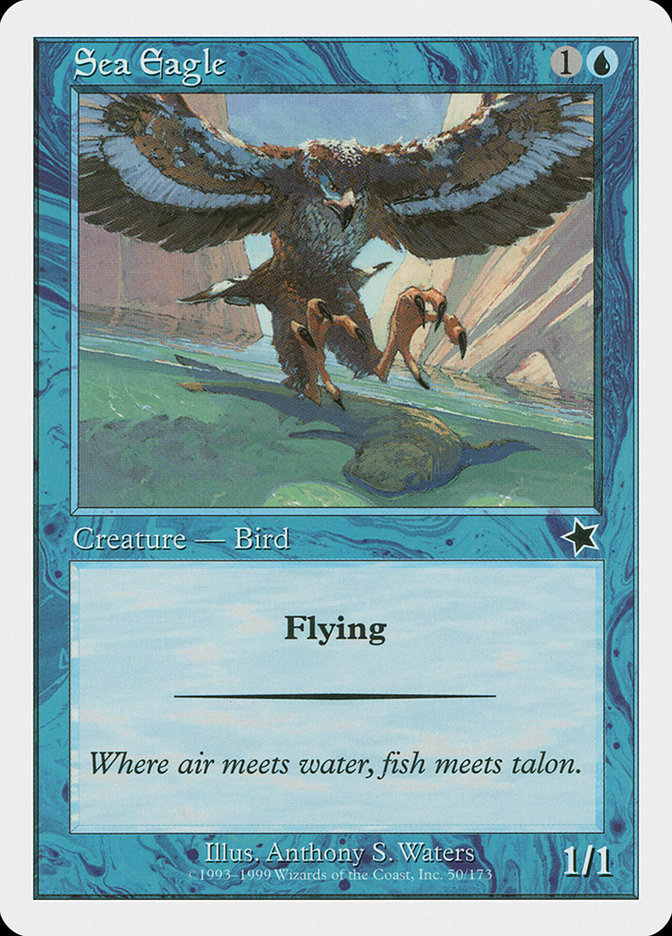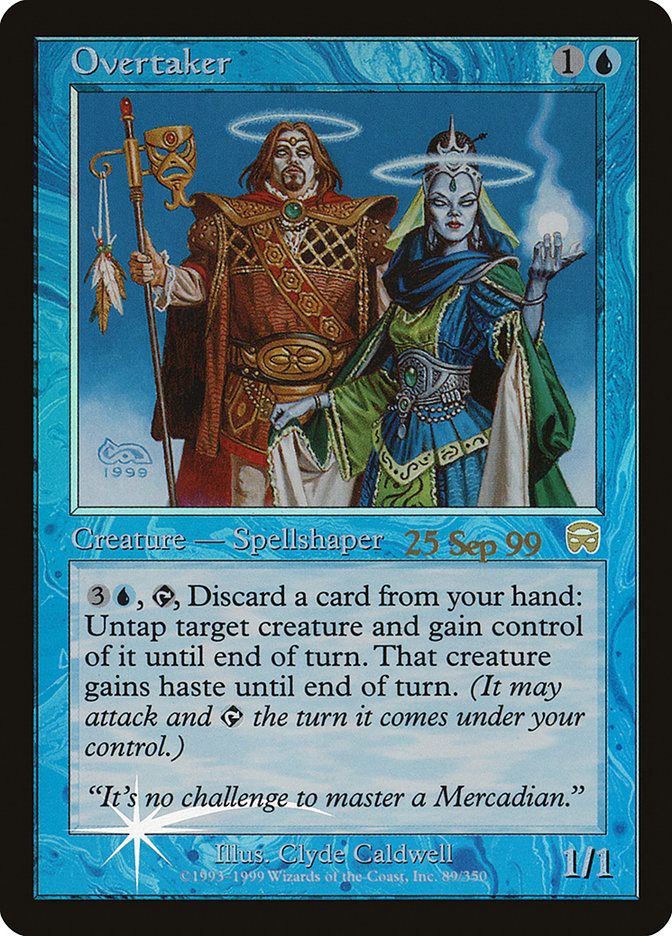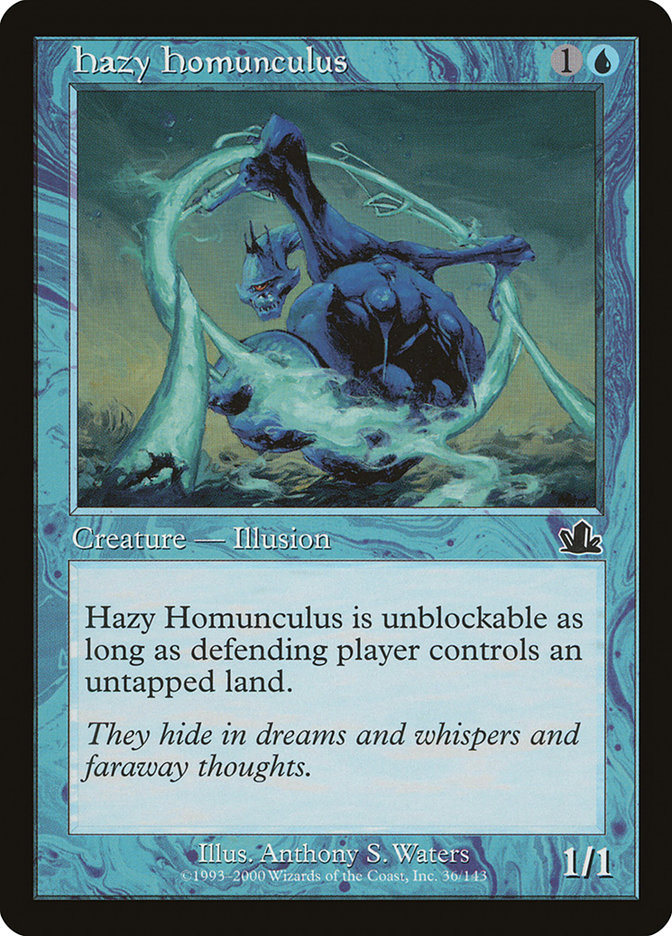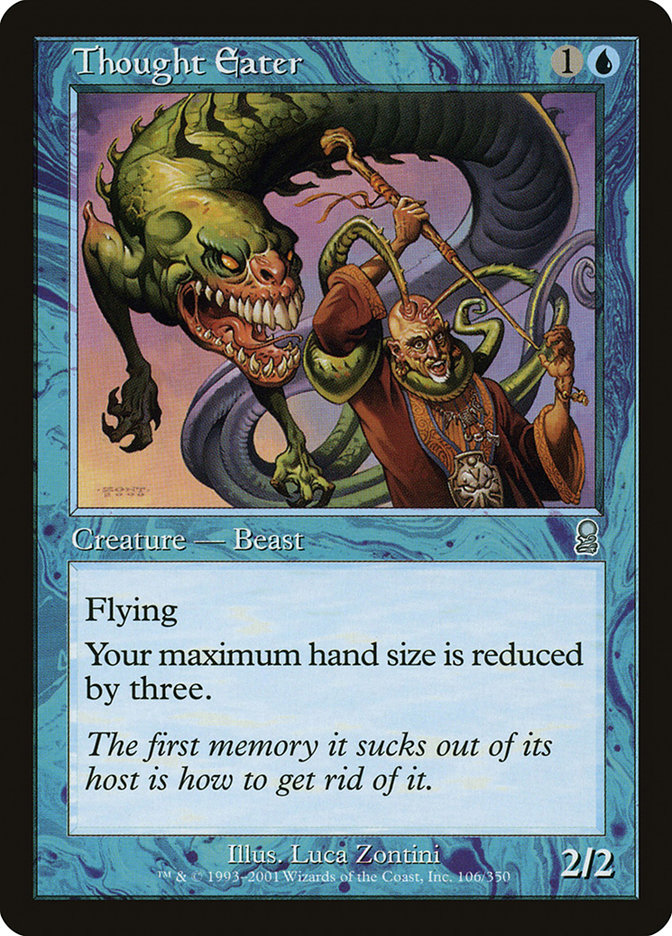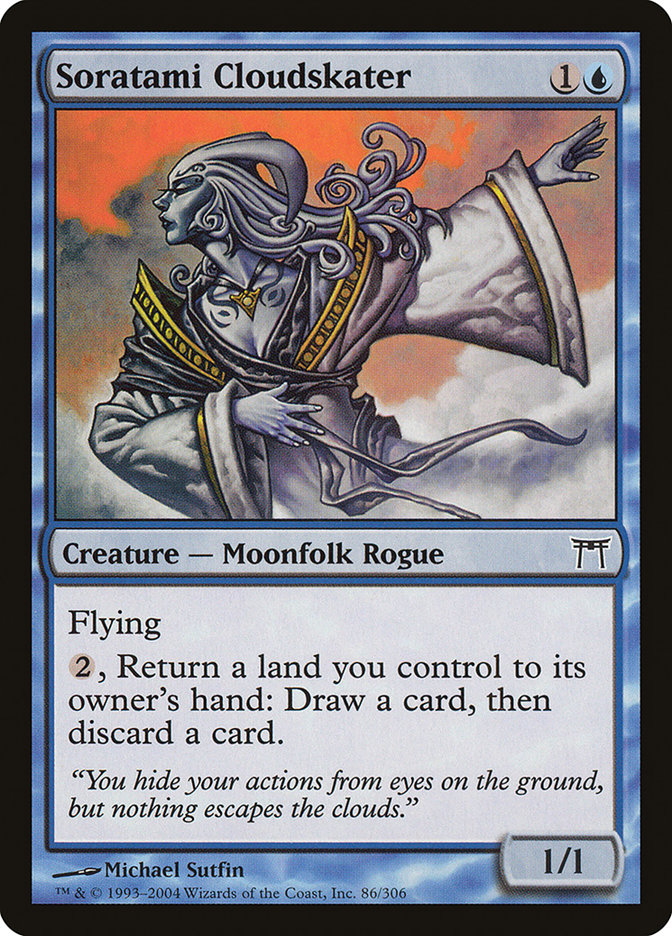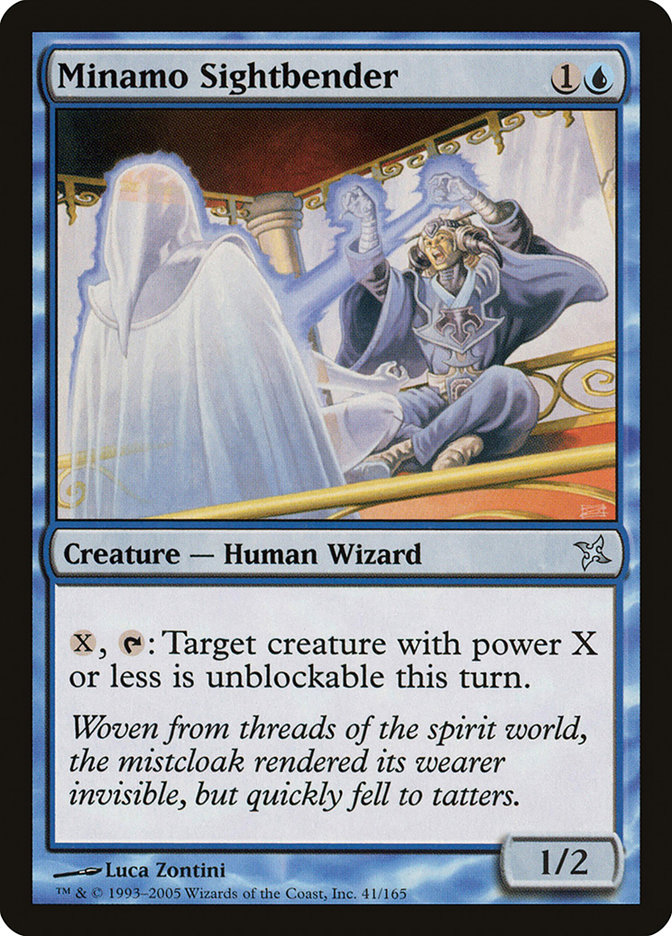Investigador arcano Carta MTG
| El coste de maná | |
| Costo de maná convertido | 2 |
| Rareza | Común |
| Tipo | Criatura — Hechicero elfo |
| Liberado | 2021-07-23 |
| Coleccione símbolo | |
| Coleccione nombre | Adventures in the Forgotten Realms |
| Coleccione código | AFR |
| Fuerza | 2 |
| Tenacidad | 1 |
| Número | 46 |
| Frame | 2015 |
| Disposición | Normal |
| Border | Negra |
| Ilustrado por | Bram Sels |
Texto de la carta
Registrar la sala — {5}{U}: Tira 1d20. 1—9 | Roba una carta. 10—20 | Mira las tres primeras cartas de tu biblioteca. Pon una de ellas en tu mano y el resto en el fondo de tu biblioteca en cualquier orden.
Cartas Similares
El Investigador Arcano es una carta de criatura interesante en MTG que encuentra su lugar en mazos que valoran la ventaja incremental. Esta carta guarda similitudes con el Augur de Bolas, ambos siendo criaturas que facilitan la ventaja de cartas. El Investigador Arcano, con su habilidad de {6} de mana para potencialmente robar una carta, ofrece una forma de robar cartas en la fase tardía del juego. En contraste, el Augur de Bolas proporciona un valor inmediato al buscar en tu biblioteca una carta instantánea o de conjuro una vez que entra al campo de batalla.
Además, el Buscador de Perspicacia es otra carta que comparte similitudes con el Investigador Arcano. Mientras que el Investigador requiere una inversión significativa de mana para robar cartas, el Buscador de Perspicacia permite filtrar cartas cada turno después de haber lanzado un conjuro que no sea una criatura, pero sin costo de mana. Ambas cartas presentan enfoques diferentes para acceder a los recursos. Luego tenemos al Oráculo de la Puerta Marítima, el cual afecta el juego en cuanto llega al campo, ofreciendo selección de cartas en lugar de robo de cartas.
Al evaluar al Investigador Arcano junto a sus compañeros, se vuelve evidente que proporciona un valor sostenido para juegos que podrían extenderse y permite lanzar hechizos significativos, convirtiéndose en un jugador sutil pero potente en el mazo de MTG adecuado.
Cartas similares a Investigador arcano por color, tipo y coste de maná
Pros de la Carta
Ventaja de Carta: El Investigador Arcano destaca al ofrecer a los jugadores la oportunidad de adentrarse más en su biblioteca. Con su capacidad para escudriñar, esta carta ayuda a filtrar tu baraja para encontrar las herramientas que necesitas para superar a tus oponentes.
Aceleración de Recursos: Además, otorga la flexibilidad de lanzar hechizos con cualquier maná de color, lo que facilita jugar cartas clave antes de tiempo y puede proporcionar la ventaja necesaria durante turnos críticos.
Velocidad Instantánea: La activación de la habilidad del Investigador Arcano a velocidad instantánea te permite adaptarte rápidamente al campo de batalla en evolución sin comprometerte a una estrategia hasta que veas cómo se desarrolla el turno de tu oponente, manteniéndolos efectivamente en la incertidumbre.
Contras de la Carta
Requisito de Descarte: El Investigador Arcano requiere que un jugador descarte una carta para activar su habilidad. Este requisito puede ser perjudicial en situaciones donde el tamaño de la mano es crítico o cuando el jugador tiene pocas opciones.
Coste de Maná Específico: El coste de activación de esta carta está limitado al maná azul, lo que puede restringir su inclusión a mazos basados en azul o multicolores, limitando posiblemente su versatilidad en un metajuego diverso.
Coste de Maná Comparativamente Alto: El coste de maná para utilizar la habilidad del Investigador Arcano es relativamente alto en comparación con otras opciones de ventaja de carta disponibles en MTG. Los jugadores pueden encontrar que otras cartas proporcionan efectos similares o mejores por menos maná, lo que hace que esta carta sea una elección menos atractiva en el juego competitivo.
Razones para Incluir en tu Colección
Versatilidad: El Investigador Arcano destaca en cualquier mazo que valore la selección de cartas y la configuración estratégica. Su capacidad para mirar las primeras cartas de tu biblioteca ofrece flexibilidad, permitiéndote adaptar tus robos al estado actual del juego.
Potencial de Combo: Con el Investigador Arcano, tienes una herramienta útil para cualquier mazo orientado a combos. No solo busca piezas de tu combo; profundiza en tu baraja para asegurar los hechizos y acciones que necesitas para ejecutar tu plan de juego ganador de manera fluida.
Relevancia en el Meta: Los mazos que lidian con un metajuego lleno de contrahechizos e interacciones se benefician al tener formas adicionales de robar cartas importantes. El Investigador Arcano puede ser crucial para encontrar esas cartas clave que te ayudan a navegar a través de jugadas disruptivas y mantener el control del juego.
Cómo Vencer
El Investigador Arcano es una de esas cartas que recompensan a los jugadores de MTG por tener un juego tardío sólido. El poder de esta carta radica en su capacidad para generar valor con el tiempo, lo que la convierte en un obstáculo potencialmente molesto de superar para cualquier oponente. Una clave para anular su efecto es reconocer que prospera con una mano llena de cartas para activar su habilidad, lo que permite a un jugador mirar las primeras cartas de su biblioteca y colocar una de ellas en su mano.
Un método eficiente para contrarrestar al Investigador Arcano es a través del uso de hechizos de eliminación que puedan lidiar con él antes de que comience a mellar el juego. Cartas como Shock o Empuje Fatal son opciones populares para manejar tales amenazas temprano. Otra estrategia es obstaculizar el tamaño de la mano de tu oponente para asegurar que la habilidad del investigador sea más difícil de activar. Por lo tanto, incorporar mecanismos de descarte en tu mazo podría frenar potencialmente el impacto de la carta.
Además, mantener la presión con un estilo de juego agresivo puede poner a tu oponente a la defensiva, reduciendo su capacidad para capitalizar la ventaja del Investigador Arcano. En esencia, mantenerse proactivo y utilizar la eliminación dirigida o la interrupción de mano puede mitigar efectivamente el impacto del Investigador Arcano en tus partidas.
Donde comprar
Si estás buscando comprar una carta MTG Investigador arcano de un coleccione específico como Adventures in the Forgotten Realms, existen varias opciones confiables que debes considerar. Una de las fuentes principales es tu tienda de juegos local, donde a menudo puedes encontrar paquetes de refuerzo, cartas individuales y mazos preconstruidos de colecciones actuales y pasadas. A menudo ofrecen el beneficio adicional de una comunidad donde puedes intercambiar con otros jugadores.
Para un inventario más amplio, particularmente de colecciones más antiguos, mercados en línea como TCGPlayer, Card Kingdom y Card Market ofrecen amplias selecciones y te permiten buscar cartas de colecciones específicos. Las plataformas de comercio electrónico más grandes como eBay y Amazon también tienen listados de varios vendedores, lo que puede ser un buen lugar para buscar productos sellados y hallazgos raros.
Además, el sitio oficial de Magic suele tener un localizador de tiendas y listas de minoristas para encontrar Wizards of the Productos con licencia costera. Recuerde comprobar la autenticidad y el estado de las cartas al comprarlas, especialmente a vendedores individuales en mercados más grandes.
A continuación se muestra una lista de algunos sitios web de tiendas donde puede comprar las Investigador arcano y otras cartas MTG:
 COMPRAR
COMPRAR BurnMana es un socio oficial de TCGPlayer
- eBay
- Card Kingdom
- Card Market
- Star City Games
- CoolStuffInc
- MTG Mint Card
- Hareruya
- Troll and Toad
- ABU Games
- Card Hoarder Magic Online
- MTGO Traders Magic Online
Ver productos MTG
Legalidades
Formatos de Magic the Gathering donde Investigador arcano tiene restricciones
| Formato | Legalidad |
|---|---|
| Historicbrawl | Legal |
| Historic | Legal |
| Legacy | Legal |
| Paupercommander | Legal |
| Oathbreaker | Legal |
| Gladiator | Legal |
| Pioneer | Legal |
| Commander | Legal |
| Modern | Legal |
| Pauper | Legal |
| Vintage | Legal |
| Duel | Legal |
| Explorer | Legal |
| Timeless | Legal |
Reglas e información
La guía de referencia para las reglas de las cartas Investigador arcano de Magic: The Gathering proporciona las reglas oficiales, las erratas emitidas, así como un registro de todas las modificaciones funcionales que se han producido.
| Fecha | Texto |
|---|---|
| 23/07/2021 | Una habilidad que te indica que tires un dado también especificará qué hacer con el resultado de ese lanzamiento. La mayoría de las veces, esto se presenta en forma de una "tabla de resultados" en el texto de la carta. |
| 23/07/2021 | Un efecto que dice "elige un objetivo, luego tira un d20" o similar aún utiliza el proceso normal de poner una habilidad en la pila y resolverla. Elegir objetivos es parte de poner la habilidad en la pila y tirar el d20 ocurre más tarde, cuando la habilidad se resuelve. |
| 23/07/2021 | Los dados se identifican por el número de caras que cada uno tiene. Por ejemplo, un d20 es un dado de veinte caras. |
| 23/07/2021 | Los dados utilizados deben tener resultados igualmente probables y el lanzamiento debe ser justo. Aunque se recomiendan los dados físicos, se permiten sustitutos digitales, siempre que tengan el mismo número de resultados igualmente probables que se especifican en la instrucción original de lanzamiento. |
| 23/07/2021 | Algunas habilidades, como la de Guía Pixie y Clase Bárbara, reemplazan el lanzamiento de un dado con lanzar dados adicionales y ignorar el lanzamiento más bajo. Los lanzamientos ignorados no se consideran para el efecto que te indicó lanzar un dado, y no causan que se activen habilidades. Para todos los propósitos, una vez que determinas qué dados cuentan, los dados adicionales nunca fueron lanzados. |
| 23/07/2021 | Algunos efectos te indican que vuelvas a tirar. Esto utiliza el mismo número y tipo de dados que la tirada original, y esa tirada usará el mismo conjunto de posibles resultados. |
| 23/07/2021 | Algunos efectos pueden modificar el resultado de tirar un dado. Esto puede ser parte de la instrucción para tirar un dado o puede provenir de otras cartas. Cualquier referencia al "resultado" de tirar un dado busca el resultado después de estas modificaciones. Cualquier cosa que busque el "resultado natural" busca el número mostrado en la cara del dado antes de estas modificaciones. |
| 23/07/2021 | Las instrucciones para lanzar un dado y el efecto que ocurre debido al resultado son parte de la misma habilidad. Los jugadores no tienen la oportunidad de responder a la habilidad después de conocer el resultado del lanzamiento. |
| 23/07/2021 | Los eventos de torneos tienen reglas más específicas con respecto a los dados y el lanzamiento de dados. Para obtener más información, consulte la versión más reciente de las Reglas del Torneo de Magic en https://wpn.wizards.com/en/document/magic-gathering-tournament-rules. |
| 23/07/2021 | Durante una partida de Planechase, lanzar el dado planar hará que se active cualquier habilidad que se active cuando un jugador lanza uno o más dados. Sin embargo, cualquier efecto que se refiera a un resultado numérico ignorará el lanzamiento del dado planar. |
